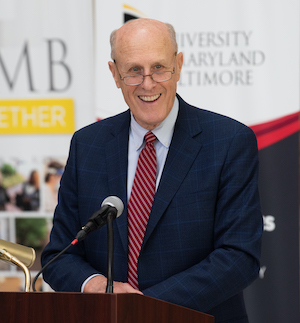Jarrell Emphasizes Leadership Development at Q&A Event
September 14, 2022 Jen Badie
President fields questions on telework, campus construction, and safety during hybrid session Sept. 13.
University of Maryland, Baltimore (UMB) President Bruce E. Jarrell, MD, FACS, emphasized faculty and staff leadership development during a wide-ranging question-and-answer session Sept. 13.
Jarrell opened the event, attended by about 130 people virtually and in person at Health Sciences Research Facility III, by discussing several programs the University is championing including a Faculty of Color Network, which the Office of Equity, Diversity, and Inclusion will launch at the end of November.
“The idea is to have a chance to meet and work with one another, to improve our climate of inclusiveness, as well as to help faculty develop their career goals and to stay at UMB,” Jarrell said.
(Watch the Q&A below or at this link.)
Other programs that Jarrell emphasized include the President’s University Leadership Program, which is designed for associate and assistant vice presidents and associate and assistant deans to develop their leadership styles, and Leaders in Education: Academy of Presidential Scholars (LEAPS), a new initiative that aims to develop faculty members’ skills and knowledge as educational thought leaders and scholars.
“We’ve maintained an active interest in making sure that there are opportunities for faculty and staff to develop their leadership skills,” Jarrell said, adding that LEAPS is an academy he has dreamed of starting for a long time.
“This is an opportunity to teach, to give faculty an opportunity to learn how to be better teachers, to contribute to the scholarly activity of learning how to educate better, and to further their careers and become an expert,” said Jarrell, pointing out that some faculty members have not taken education courses.
Jarrell also discussed the Future of Work Task Force, which is creating recommendations on work flexibility and employee well-being, and answered a question about whether the University’s telework policy would change before the task force completes its work.
“We changed our telework policy to make it more flexible and yet still give schools individual discretion,” he said. “I can’t see that policy changing right now. We’re waiting to see what the recommendations are and whether they require a policy change.”
In addition, Jarrell announced the groundbreaking in October of a new building at Martin Luther King Jr. Boulevard and Baltimore Street that “will change the face of our campus and change the face of the BioPark.”
Mary Morris, director of the Baltimore Fund in the Office of Research and Development, said the site, which is being built with private funding, will be mixed-use and is expected to be completed in 2024.
“There will be private space, UMB will also have space, and we will have flex labs for early-stage companies,” she said, adding that the new building — dubbed 4 MLK — will have open space for innovators in the community and also will attract smaller companies.
Jarrell also talked about safety and security near campus, saying that drug dealing has made some feel unsafe walking on Eutaw Street to places such as the Hippodrome Theatre and Lexington Market. He said the School of Social Work and UMB Police Department are working to make the areas around the campus safer.
“We’re making progress, but it’s not a simple solution of the police coming in and pushing people away. It’s not that at all. It’s about giving those individuals opportunities that hopefully will improve their life,” he said.
Jarrell fielded several questions about construction around campus as workers lay cable for an electrical project. That project is estimated to be complete in 2025.
After the session, attendees were treated to ice cream from local Baltimore favorite Taharka Bros.